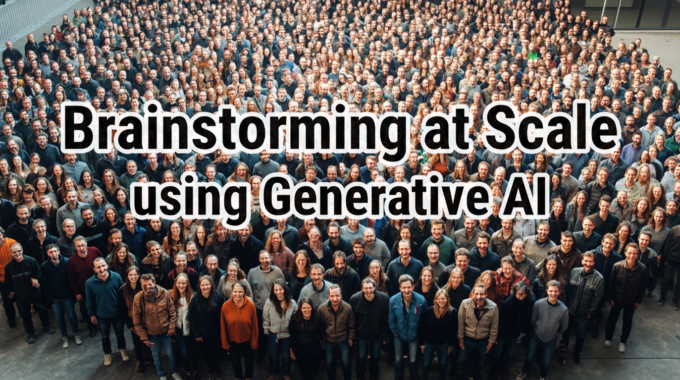
See Original Press Release here: April 21, 2025 – CMU Press Release
Thinkscape.ai Preferred Over Traditional Enterprise Platforms
Humans are not the only species that deliberate in groups to reach decisions; schools of fish, flocks of birds, and swarms of bees can reach rapid decisions about life-or-death issues before finding an optimal solution. Biologists refer to this collaborative decision-making process as swarm intelligence (SI), which enables many social organisms to make decisions that are significantly smarter than the decisions individual members could make on their own.
Artificial swarm intelligence (ASI) is a technology developed in 2014 to allow networked groups of people to make collaborative decisions by deliberating in systems modelled on biological swarms. A next-generation technology developed in 2023, conversational swarm intelligence (CSI), combines the principles of ASI with the power of large language models.
In a new study, researchers focused on the use of a CSI platform called Thinkscape to enable real-time brainstorming and prioritization among groups of networked users. The study used a variant of a common brainstorming intervention called an alternative use task (AUT) and compared brainstorming using a CSI platform to a traditional text-chat environment. Researchers found that participants significantly preferred the CSI platform.
The study, by researchers at Carnegie Mellon University and Unanimous AI, appears in the Proceedings of the 27th International Conference on Enterprise Information Systems.
“Overall, our results suggest that CSI is a promising GenAI-based method for brainstorming and prioritizing on a large scale,” says Ganesh Mani, Professor of Innovation Practice and Director of Collaborative AI at Carnegie Mellon’s Tepper School of Business, who coauthored the study. Gen AI, or generative artificial intelligence, is a type of artificial intelligence (AI) that can create new content using machine learning and natural language processing to mimic human creativity.
In this study, each of two groups of 75 participants took part in a 30-minute session in which they performed two AUT brainstorms for 12 minutes each (one using CSI and one in a traditional chat room). Then, each individual completed a subjective feedback survey to compare the two experiences. Among the study’s findings:
- Participants significantly preferred using CSI, reporting that it felt more collaborative and more productive, and was better at producing high-quality answers.
- More than 80% of the participants reported feeling “more heard” during each CSI deliberation and came away feeling “more ownership” and “more buy-in” for the resulting answers than they did in a traditional real-time chat environment.
“Future studies of CSI should test collaborative brainstorming and prioritization among significantly larger groups to validate use among hundreds or thousands of simultaneous participants,” suggests Anita Williams Woolley, Professor of Organizational Behavior at Carnegie Mellon’s Tepper School of Business, who coauthored the study.
“The average Fortune 1000 company has more than 30,000 employees, so the ability to engage large groups in real-time discussions, brainstorms, evaluations, debates, assessments, and prioritizations could be a powerful collaborative way to solve problems, plan projects, forecast outcomes, assess risks, capture employee feedback, and encourage the cross-pollination of ideas across large companies,” adds Christopher Dishop, Post-Doctoral Fellow of Organizational Behavior and Theory at Carnegie Mellon’s Tepper School of Business, who coauthored the study.
Learn more about conversational swarm intelligence and brainstorming from coauthor Louis Rosenberg’s presentation to the 2025 Int. Conference on Enterprise Information Systems.
###
See Original Press Release here: April 21, 2025 – CMU Press Release
Summarized from an article in Proceedings of the 27th International Conference on Enterprise Information Systems, Large-Scale Group Brainstorming and Deliberation Using Swarm Intelligence and Generative AI, Rosenberg, L (Unanimous AI), Schumann, H (Unanimous AI), Dishop, C (Carnegie Mellon University), Willcox, G (Unanimous AI), Woolley, A (Carnegie Mellon University), and Mani, G (Carnegie Mellon University). Copyright 2025 SCITEPRESS—Science and Technology Publications. All rights reserved.



